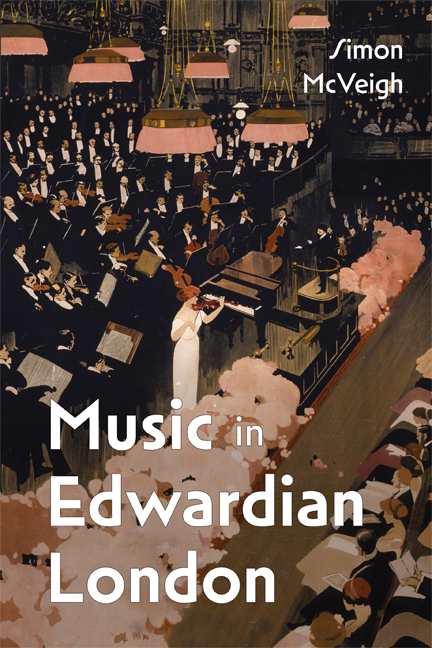Book contents
- Frontmatter
- Dedication
- Contents
- List of Illustrations
- Preface
- 1 Edwardian Soundscapes
- 2 Mapping a Musical City: Place (and Class)
- 3 Mapping a Musical City: Time (and Taste)
- 4 London as Musical Hub: Europe, America, Empire
- 5 The British Question
- 6 Britain and ‘Others’
- 7 Hidden Voices
- 8 From Battersea to Bermondsey: Suburban Music and Local Politics
- 9 London’s Music: An Overview
- Sources and Bibliography
- Index
- Miscellaneous Endmatter
8 - From Battersea to Bermondsey: Suburban Music and Local Politics
Published online by Cambridge University Press: 09 May 2024
- Frontmatter
- Dedication
- Contents
- List of Illustrations
- Preface
- 1 Edwardian Soundscapes
- 2 Mapping a Musical City: Place (and Class)
- 3 Mapping a Musical City: Time (and Taste)
- 4 London as Musical Hub: Europe, America, Empire
- 5 The British Question
- 6 Britain and ‘Others’
- 7 Hidden Voices
- 8 From Battersea to Bermondsey: Suburban Music and Local Politics
- 9 London’s Music: An Overview
- Sources and Bibliography
- Index
- Miscellaneous Endmatter
Summary
SO FAR, I’VE CONCENTRATED largely on music at the centre of the metropolis, especially at those iconic venues just north of the river. Yet it would be a mistake to underestimate the astonishing amount of music-making beyond the West End. A glimpse at those districts immediately south of the river, concentrating on Battersea, Brixton and Bermondsey, should illuminate not only suburban music but also music's role within the political debate.
Much south of the river remained undeveloped until the nineteenth century, when its former marshlands housed many of London's least well-off. Bermondsey's tenement housing resembled that of the East End, just across the river: it was here where philanthropic musical ventures were mostly directed.
As London's population expanded, and as working patterns changed, new railway lines extended commuting to a ring of suburbs bordering the capital. Large swathes of south and south-east London missed out on the Underground, for social and geological reasons, contributing to a sense of separation persisting to this day. Still, Brixton and Battersea were perfectly convenient, with trains into Victoria and Waterloo: and in 1900 Clapham Common station opened, giving direct access to the City.
Brixton typified the modestly comfortable south London suburb: a classic mix with wide avenues of affluent townhouses flanked by serried rows of undistinguished terraces. Battersea was more diverse. Some streets around the park displayed serious wealth, but areas bordering the river fell into what Charles Booth in his London Poverty Maps listed as ‘very poor’, and even ‘semi-criminal’.
❧ Life in the suburbs
It's impossible to miss the snide mockery that the suburbs attracted. T.W.H. Crosland set the tone in 1905 in The Suburbans: ‘penny buses, gramophones, bamboo furniture, pleasant Sunday afternoons, Glory Songs, modern language teas, golf, tennis, high school education.’1 For liberal politician Charles Masterman, in his searching analysis of The Condition of England (1909), unobtrusive middle-class suburbanites may have been ‘liberated from the devils of poverty’, but ‘the soul is still empty, swept and garnished; waiting for other occupants’. He described the ‘miles and miles of little red houses in little silent streets’, the tiny gardens of Acacia Villa or Camperdown Lodge – the men sucked into City offices at daybreak, the women occasionally treating themselves to West End shops and theatres.
- Type
- Chapter
- Information
- Music in Edwardian London , pp. 253 - 277Publisher: Boydell & BrewerPrint publication year: 2024

